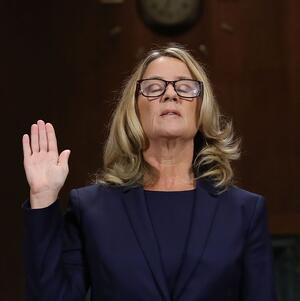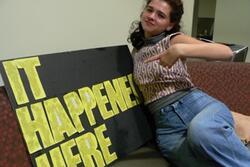She Said "Hello"
A while ago, my mother and I were out shopping and ran into someone we knew. My parents had spent a lot of time with this person over the years, so I prepared for a long catch-up. But my mom simply said a pleasant “Hello” and kept walking. I didn’t realize until we were in the car that my parents were no longer speaking to this person. They’d had a falling out, and not over something petty—it had involved the unapologetic use of a racial slur. I had a chuckle over this: The closest my mother could come to completely rebuffing someone was to politely say “Hello” and keep walking.
I thought of this as I listened to the testimony of Dr. Christine Blasey Ford during Judge Kavanaugh’s Senate confirmation hearings last week. There were many disturbing details about her account: that her attacker put his hand over her mouth to keep her from screaming, that she worried that she would suffocate, that her attackers laughed while they assaulted her.
But what struck me most was her account of running into Mark Judge weeks later at the grocery store. She said he looked uncomfortable when he saw her. The prosecutor questioning her asked how she knew he was uncomfortable. Dr. Ford said, “I said hello to him and his face was white and very uncomfortable saying hello back.”
According to her testimony, this boy had been present at one of the most traumatic moments of her life. He had stood by while another boy attempted to assault her, laughing, egging him on, and possibly waiting his turn. And still, she felt compelled to say “Hello” to him.
The events of recent weeks have drawn our attention to many problematic aspects of our culture: We dismiss acts of sexual violence as horseplay or youthful indiscretion. We refuse to believe women, blame them for their attackers’ actions, and then question why they don’t come forward when they are attacked. And after all that women are asked to endure—from microaggressions to verbal harassment to physical assault—we are still asked, constantly, to be nice.
I’m currently reading Not That Bad: Dispatches from Rape Culture, an anthology edited by Roxane Gay. While making my way through the book, I’ve been struck by how many women felt they had to be nice to the person who violated them. How many women stayed in—or returned to—the room, the car, or the relationship, for fear of breaching some unwritten social contract to be nice and polite and not make a scene? How many women have tried to gracefully exit a situation when the best course of action might have been to say, firmly, “I’m leaving” or “You have to go now”?
So many women are socialized to be nice rather than to advocate for themselves, even at the expense of defining and defending their physical boundaries. As we enter spaces traditionally occupied by men (or anywhere), we are taught that we have to be nice to make people feel comfortable with our presence, even when that comfort comes at our own detriment—even when people are decidedly not nice to us.
As Dr. Ford gave testimony about one of the worst experiences of her life, she was consistently patient, deferential, and apologetic to the committee. At one point, she even apologized for that behavior, saying, “I’m used to being collegial.” Her stated desire to be “helpful” stood in stark contrast to the tone of Judge Kavanaugh’s testimony. Clearly, no one had told him he had to be nice.
While socializing women to be nice plays a huge part in perpetuating rape culture, it also has an effect on the larger continuum of behavior that perpetuates gender inequality.
Dr. Ford’s testimony reminded me of all the times I chose to play nice, sometimes at my own expense. I remembered saying something firmly in a professional setting, then softening it with laughter or an apology. I remembered being patronized, diminished, and even publicly humiliated, and smiling in response rather than confronting the perpetrator and “making a scene.” I remembered deciding not to call out sexism during a professional interview, because I knew it would cost me the job. I remembered complaining to my supervisor that a coworker was being disrespectful towards me and being told I had to “win them over.”
This kind of behavior can be hard to unlearn once it has been learned. Since I spend a lot of my time as a professional talking to young people and their families, I’ve started to think about how we might change the way we speak to young people at the outset.
What would it be like if, instead of teaching young women to be nice, deferential, and apologetic (and teaching the world to expect that from them), we taught them a new vocabulary?
You can’t talk to me like that.
You can’t touch me like that.
You can’t treat me like that.
I’m leaving now.
You need to leave now.
What if we taught young women to say this without shaking, without laughing, and without apologizing? And how might we teach young men (and other young women) to hear those words, and respect them?
Sometimes, I’ll describe a difficult conversation or situation at work to my mother. Hearing the anger and agitation in my voice, feelings I might have been suppressing all day, she’ll say, “I hope you were nice about it.”
And I’ll sigh heavily, “Of course I was nice about it.”
Share your own #MeToo story with us.








I cringe when I think back on all the times I had to act nice when I should’ve spoken out. I had rage throughout my life up until I got divorced and became a single parent. I’ve been empowered with the ability to achieve what most women think they can’t. I no longer have free floating rage. I say what needs to be said, do what needs to get done and I don’t do nice. I’m 60.
I blamed myself for visiting a slavic university student for my sentimental memories of Yugoslavia. Years later, when my daughter read my book, she cried out: "but mom...you were raped".
I think that the situation often is more complicated than those described above, the desire to respond forcefully might be blunted by feelings of guilt, false responsibility in causing the abhorent male behavior in the first place. Or, in a social setting, affecting others in your social circle related to the offender. I will look for your thoughts on this, finding your statement sensitive and to many points.
It is with great pride that I am able present myself to the world as an independent intelligent Jewish woman. Being born in 1948, I too was taught to "be nice." However, I was also taught not to take any crap from anyone.My Mother made sure I did not suffer the indignities of her generation being born in 1914. I was even taught it was OK to beat a boy at ping pong, or marbles or tennis and certainly not to be dismissed as a professional person. I am honored to support this organization...lets turn up the volume even more. May we make our foremothers proud of us as we face the present sexist scourge. Our actions honor all the women who fought the injustices of their generation from Judith in Bibical times to the Nortoorious RBG. . Thank you for all you do.
Thank you for your omens. I am 91 years old and can relate so well to what you have said!!
I am a very angry 75 year old woman. Now that Dr. Ford has spoken out, she will be the one to pay; not just because of her testimony but because of the outrageous attack upon her from the person noted to be the President of the United States. She may pay far more from the backlash than from the original sexual assault. I'm not sure I know a womman who has not faced some kind of sexual "assault" (yes, it is difficult for me to use that word) at some point in her life. I could immediately name four of my own; an uncle, a friend's father, a date and a priest at a professional meeting. I'm sure anyone reading this has her own list. If we thought "Me Too" was a new beginning, I fear that just with all the other rights I spent so much of my adult life fighting for and am now losing, we will lose this battle too. If someone has the answer, please write in.
In reply to by Barbara Bornstein
#Me Too. I have been assaulted and harassed from early childhood and into middle age. It has been something I have mentioned to very few people. When I first told a few people close to me when I was in my mid-life, I did not feel supported or any empathy. So, I reserved my sharing for counselors and a support group. But, if anyone who is neither a counselor or a someone who has been victimized, it is rare to be met with compassion and loving kindness. Even in a religious setting within the last year, some men have said "The #Me Too movement goes too far and is really a lynching party." These were men over 65. Are younger men more likely to be sensitive to this issue.
Thank you Rabbi for the suggestion of training young girls to be assertive, rather than always "nice." To protect oneself is case of BEING NICE TO ONESELF!! That is what we women have not been taught. I am glad you will be at the forefront of this change.